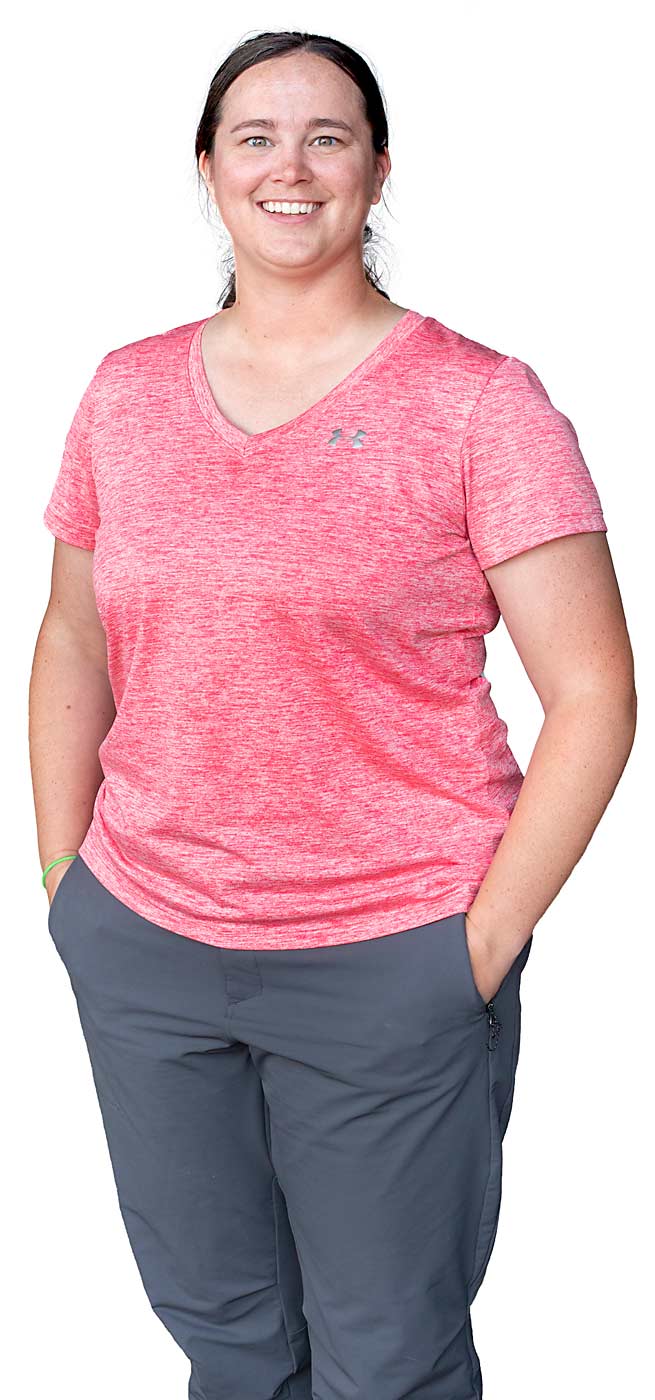family background/Sarah is a fourth-generation grower who graduated from Michigan State University and is the co-chair of the Mid-Atlantic Young Grower Alliance. She is married to Mitch Zost and is the daughter of Barb and Jim Lott.
age/31
grower/Gardners, Pennsylvania
crops/Apples
business/Bonnie Brae Fruit Farms

How did you get your start?
I first worked on the farm at 13 years old in the summers with my family and friends. We had to train young trees, thin and pick peaches — do all the kinds of jobs that make you wish as a kid to be back in school sitting in air conditioning.
Then I got a degree in agriculture and came back to work on food safety, fruit maturity testing and then jumped into more of a managerial level.
What did you study in college?
Our farm is roughly about an hour and half from Penn State, but I decided to go to Michigan State — “Go Green!”— because they had a great agribusiness management and horticulture program where I could get classes in both of those areas. I’m interested in ag business and horticulture, but I thought I needed the business classes more, to someday run the farm and handle the finances.
We had a financial analysis class that was tough to get through, but it was important to learn all the basics — from balance sheets to income statements — but also how to use information to make financial forecasts to help you make decisions when you’re betting a lot of money on turning the business one way or another.
I think that kind of class is really useful for someone coming back to the farm. With extension and grower meetings you can learn a lot of the hands-on farm things, but learning the nitty-gritty financial stuff is useful to learn in college.
What did you do when you returned to the farm?
One of the first things I did when I returned to the farm from college was not in the financial end. I was given the food safety handbook and told: “Here, do this, please.” I think this is happening to a lot of people in my generation on farms. Also, when I was in college, I did a job where I was doing a lot of maturity testing of fruit in a postharvest lab, so I ended up taking that on at our farm during harvest.
I also took on supervisory roles for our crews and started learning some office and back-end recordkeeping stuff. I upgraded our payroll program because the old one was going away, and I added more Excel spreadsheets and production records.
This way, when we’re in the middle of harvest — wondering, “what’s the average we produce on this crop?” — we can come up with an answer quickly. Some of the jobs are really intense during certain parts of the year, yet other parts of the year are very quiet.
Are there any other projects you’re directing?
We’re slowly transitioning to higher-density apple blocks. Our highest-density planting is 2.5 feet by 12 feet, and I don’t know if we’ll go that tight again. A 4-foot by 14-foot block is about as close as we’ll go most of the time — because we have big hills and it can be dangerous to run equipment through those hills.
Where we have flat ground, we put in higher density, such as a new Ambrosia block. When we were planning that block, we met other Ambrosia growers on an IFTA trip, and they recommended that we plant that variety closer than 4 feet by 14 feet.
I led that effort here on the farm, to learn and figure out how to plant this variety. Now we’re in the trellis business. I’ll also be figuring out how to pick it, because the way we traditionally pick is not very conducive to trellis, so our first pick is going to be a fun experience.
What would you recommend to young growers?
Someone heading out of high school or in college, I’d recommend studying whatever aspect of the business that most interests you, because that’s where you’ll end up spending most of your time.
You’ll find in your first job that you’ll be the person that has that interest and done the work to be in charge of that new thing. I’m the co-chair of the Mid-Atlantic Young Grower Alliance, and I also strongly suggest to those in our area to join up, but if you’re in another area, you should look for groups that target young professionals in the industry.
You’ll have opportunities to have tours of other farms and workshops, geared specifically toward the younger generation, that hit on timely topics that you’re thinking or worried about.
—TJ Mullinax






Leave A Comment